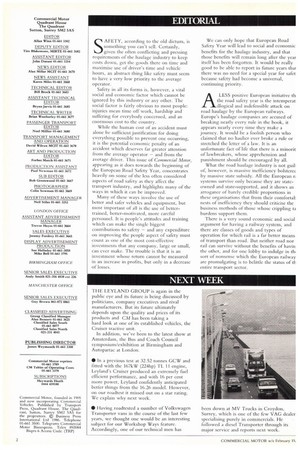S AFETY, according to the old dictum, is something you can't
Page 2

If you've noticed an error in this article please click here to report it so we can fix it.
sell. Certainly, given the often conflicting and pressing requirements of the haulage industry to keep costs down, get the goods there on time and maximise use of driver's time and vehicle hours, an abstract thing like safety must seem to have a very low priority to the average operator.
Safety in all its forms is, however, a vital social and economic factor which cannot be ignored by this industry or any other. The social factor is fairly obvious to most people: injuries mean time off work, hardship and suffering for everybody concerned, and an enormous cost to the country.
While the human cost of an accident must alone be sufficient justification for doing everything possible to prevent one occurring, it is the potential economic penalty of an accident which deserves far greater attention from the average operator — and from the average driver. This issue of Commercial Motor, appearing as it does towards the beginning of the European Road Safety Year, concentrates heavily on some of the less often considered aspects of road safety as they affect the transport industry, and highlights many of the ways in which it can be improved.
Many of these ways involve the use of better and safer vehicles and equipment, but most important of all is the use of bettertrained, better-motivated, more careful personnel. It is people's attitudes and training which can make the single biggest contributions to safety — and any expenditure on improving the people aspect of safety must count as one of the most cost-effective investments that any company, large or small, can ever make. The trouble is that it is an investment whose return cannot be measured in an increase in profits, but only in a decrease of losses. We can only hope that European Road Safety Year will lead to social arid economic benefits for the haulage industry, and that those benefits will remain long after the year itself has been forgotten. It would be really good to be able to report in future years thai there was no need for a special year for safet because safety had become a universal, continuing priority.
ALESS positive European initiative th the road safety year is the intemperat illogical and indefensible attack on road haulage by the European railways. Europe's haulage companies are accused of breaking nearly every rule in the book, it appears nearly every time they make a journey. It would be a foolish person who claimed that no haulier ever broke a rule or stretched the letter of a law. It is an unfortunate fact of life that there is a minorit of lawbreakers, whose apprehension and punishment should be encouraged by all.
What the road haulage industry is not gin!' of, however, is massive inefficiency bolsterec by massive state subsidy. All the European n systems survive only because they are stateowned and state-supported, and it shows an arrogance of barely credible proportions in these organisations that from their comfortah nests of inefficiency they should criticise the business methods of those whose crippling ta burdens support them.
There is a very sound economic and social argument for having a railway system, and there are classes of goods and types of operation for which rail is a far better means of transport than road. But neither road nor rail can survive without the benefits of havin the other, and for one lobby to indulge in till sort of nonsense which the European railway are promulgating is to belittle the status of th entire transport sector.






















































